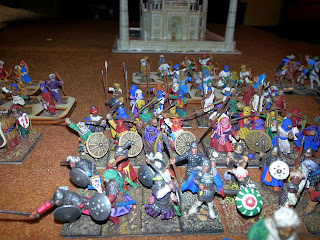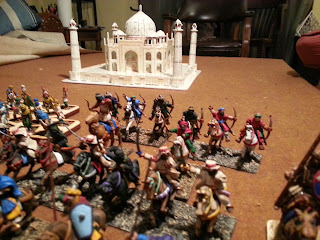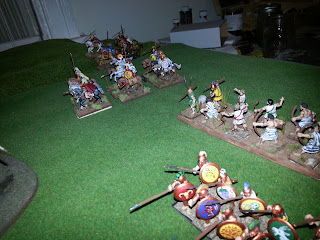M's Celts and my Greeks had fought once before, and it's documented on this blog. That time, it had been a fairly even slog, with two tough front lines bleeding but refusing to break. Our last game, though, was a quick, decisive murder. Read on!
M's Celts: a ragged but vicious mob.
My Greeks: ordered, disciplined warriors, the sword arm of civilization. In the back, the Golden Fleece.
More Greeks.
Keep an eye on that Greek medium cavalry.
After a number of failed commands from the Celtic commander, I charge the medium cavalry into a warband which is still sitting on the Celtic starting line. This is risky; the warband is going to be rolling approximately as deadly a hand of dice as I am (med cav supported by a few light cav). BUT if my cav gets beaten, there was a good chance it would retreat, damaged, and still be of some use to me later on. If the foes lost the battle, they were likely to get driven off the table.
After a round or two, that was what happened. The dice went my way, the gamble paid, and in a round or two the cavalry had driven the warband off.
Now the cavalry had the position to threaten a second warband, this time in its flank. Still scary because they're doing this without support; the hoplites aren't in position yet.
Now the phalanx clashes with the warband.
Both of us are using the pig's head formation.
My hoplites' toughness, especially that of these Spartans, gave me a minor advantage in the massed melee.
In the upper right hand corner you can see that medium cavalry sweeping behind M's line. Engaging a phalanx to the front while cavalry hits you in the flank or rear is hopeless. It's this "hammer and anvil" approach that made Alexander unbeatable.
M pulls off a nice tactical move here, smashing into my Spartans with chariots, and hitting them right on the flank when they're engaged -- essentially what I'd been doing to him for the previous three or four rounds. But the Spartans, being Spartans, do not break, and it's just too late for the Celtic chariots to turn the tide.
(Not pictured, three units of hoplites and a unit of slingers whose poor command checks kept them from ever getting involved in the fight. Mike suffered even worse than I from having his troops stand around listlessly.)
With the warbands falling back, I pull some hoplites out of rearguard and march them up to face the chariots head-on. At this point, hammer-and-anvil had eliminated so many warbands that the whole Celtic army had to withdraw.
The first clash, between cavalry and warband, pretty much sounded the Celts' doom, though M tried doggedly to turn it around. The battle would have been very different if the barbarians had shrugged off the first charge. After the match, we counted up our armies' points (neither of us had bothered to count points beforehand because we're just in it for the lulz and an opportunity to play with our toys. I think my army was worth 249 points and his was maybe 219, so I had been playing with an advantage (tainted victory!) He had been matching me warband-for-phalanx each game when we laid out our divisions, and neither of us had been considering that medium infantry are not equivalent to heavy infantry (espacially Disciplined, Elite, Stubborn heavy infantry like those Spartans). He should be getting an extra warband or chariot unit each game, which could really help these Celts. It'll be tough for me not to get my front line outstretched or flanked.






















































